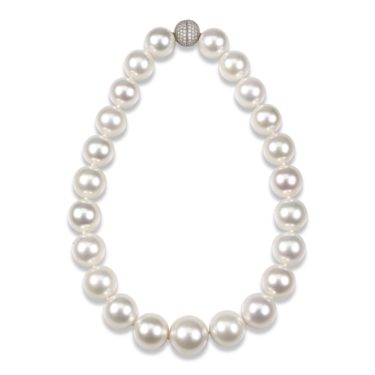After making such an exciting purchase as a gorgeous, unique piece of fine jewelry, such as a striking sapphire bracelet or a luminous strand of Tahitian south sea pearls, it would be devastating to have it damaged. If you want to preserve the life of your fine jewelry, it is essential that you properly care for the precious stones and metals. If you don’t know how to clean gemstones, our experts can help. Here are some of the best ways to clean and care for your gems and precious metals to ensure they sparkle and last for generations to come.
The Jewelers of America Association suggests that fine jewelry be taken to a jeweler twice a year for professional cleaning, and once a year for repair "checkups." However, in between professional cleanings there are several ways you can care for your gems at home.
STORING YOUR GEMSTONE JEWELRY
Generally speaking, it’s always best to store your jewelry in a fabric-lined jewelry case. However, if you use an unlined box, be sure to wrap each piece individually in soft fabric or tissue to prevent them from scratching against one another.

Always store your gems in a jewelry box or bag: Some gemstones, such as pearls, opals, amethyst, and topaz, are more sensitive to light and heat, which can tremendously alter the face-up color of the gems over time.
Expert Tip: Make sure your gemstone jewelry is stored out of direct sunlight to avoid excessive heat exposure.
Pearls, specifically, need moisture to maintain their natural luster, as sudden changes in temperature can cause pearls to dry out and crack. For this reason, it is not recommended to keep jewelry pieces with pearls and opals in a safety deposit box, lockbox, or safe, as these environments are far too dry for those stones and can cause them to bleach or crack.
CLEANING YOUR GEMS
There are several ways to clean your jewelry with gentle products you already have in your home, the trick is to determine which methods are appropriate for each piece.
Gentle cleaning with warm soapy water is the safest way to clean your gems yourself, just make sure that the soap you are using is detergent-free. In some situations a dental water flosser is also an appropriate cleaning tool that requires no soap. Always use a cup or bowl to clean your gems so that they don't accidentally slip down the drain in the sink!

Make sure you dry your jewelry piece with either a soft cloth or compressed air, to ensure you aren't left with any water spots from air drying.
Expert Tip: Using compressed air will help dry the small spaces underneath your gem's setting.
For pearls, warm soapy water and an unused makeup brush are just gentle enough. Make sure you lay strung pears flat to dry completely, as any handling while the string is still wet can cause it to stretch. Strung pearls that are worn often should be restrung annually.
ULTRASONIC CLEANING
Ultrasonic cleaning is a great way to care for precious metals such as gold and platinum, diamonds, and many other untreated or softer gemstones. If you are working with softer gemstones or other precious metals, make sure to be gentle and avoid a harsh cleaning solution.
A bath of hot water with ammonia, or steaming are also great ways to clean harder gems, including diamonds, rubies, sapphires, and alexandrite.
However, there are several softer gemstones that cannot be cleaned this way: Never clean the following delicate gemstones in an ultrasonic cleaner or steamer, as they are naturally more susceptible to temperature changes: These include emeralds, aquamarine, tanzanite, feldspar, fluorite, iolite, kunzite, lapis lazuli, malachite, opal, topaz, turquoise, and zircon.
Organic materials such as amber, pearls, coral or ivory should never be treated in an ultrasonic cleaner.

Treated gems, such as heat treated sapphires or oil filled emeralds, can be negatively affected by solvents, steam, or ultrasonic cleaners. Before you utilize any of these cleaning methods, be sure you know what treatments your gems have undergone and if they are compatible with ultrasonic technology.
EVERYDAY CARE FOR YOUR GEMS
Day-to-day activities and chemicals in cosmetics you use every day can be harmful to your jewelry. Hairspray, perfumes, and certain household cleaners can all contain harmful ammonia that is too harsh for delicate gems, particularly porous stones such as pearls and turquoise.
Expert Tip: Shower and apply lotions, sunscreens, and cosmetics - all before you put on your jewelry.
Always remove your jewelry before going for a swim: during the summertime, be sure to take particularly good care of your jewelry, as salt water or harsh chemicals in swimming pools such as chlorine can discolor or pit metals, especially gold. It can also damage settings, which could cause gems to become loose.
CARING FOR SILVER
When caring for silver, it’s essential that you take the utmost caution when handling your antique pieces. Silver is the must sensitive of the precious metals, as it is very vulnerable to tarnishing. There are many dos and don’ts of caring for silver, which is why it is imperative that you do your research before trying to clean your jewelry yourself. To prevent tarnishing, don't wear your silver jewelry in hot or humid environments like the shower, sauna, or hot tub.
Store your silver jewelry in a cool dry place, such as a jewelry box. For added protection, invest in anti-tarnish strips to place in the jewelry box, to even further slow the tarnishing process.
If your silver does tarnish, its best to use a high quality silver polish, rather than a fast acting "dip" or harsh cleaning solution, as these can remove too much of the silver material and damage your jewelry.
Now that you know how to take care of your favorite unique jewelry, why not add to your collection?







